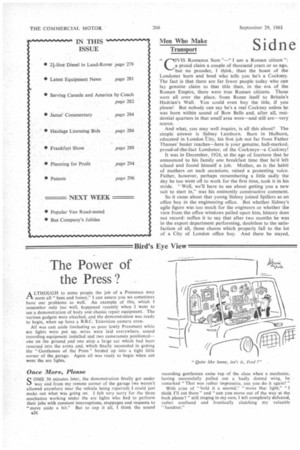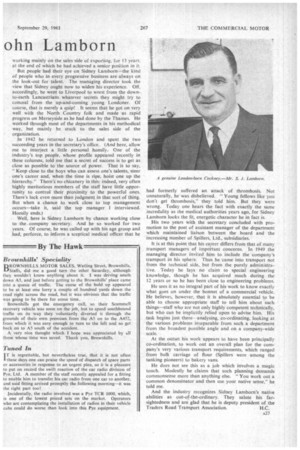Men Who Make Transport
Page 28

Page 29

If you've noticed an error in this article please click here to report it so we can fix it.
Sidne ohn Lamborn
Li IVIS Romanus Sum "—" I am a Roman citizen ":
a proud claim a couple of thousand years or so ago,
but no prouder, I think, than the boast of the Londoner born and bred who tells you he's a Cockney. The fact is that there are far fewer people today who can lay genuine claim to that title than, in the era of the Roman Empire, there were true Roman citizens. Those were all over the place, from Rome itself to Britain's Hadrian's Wall. You could even buy the title, if you please! But nobody can say he's a real Cockney unless he was born within sound of Bow Bells and, after all, residential quarters in that small area were—and still are—very scarce.
And what, you may well inquire, is all this about? The simple answer is Sidney Lamborn. Born in Holborn, educated in London bity, his first job not far from Father Thames' busier reaches—here is your genuine, hall-marked, proud-of-the-fact Londoner, of the Cockneys—a Cockney!
It was in December, 1924, at the age of fourteen that he announced to his family one breakfast time that he'd left school and found himself a job. Mother, as is the habit of mothers on such occasions, raised a protesting voice. Father, however, perhaps remembering a little sadly the day he too went off to work for the first time, took it in his stride. "Well, we'll have to see about getting you a new suit to start in," was his eminently constructive comment.
So it came about that young Sidney joined Spillers as an office boy in the engineering office. But whether Sidney's agile figure was too much for the engineers or whether the view from the office windows palled upon him, history does not record: suffice it to say that after two months he was in the export department performing, doubtless to the satisfaction of all, those chores which properly fall to the lot of a City of London office boy. And there he stayed, working mainly on the sales side of exporting, for 13 years, at the end of which he had achieved a senior position in it.
But people had their eye on Sidney Lamborn—the kind of people who in every progressive business are always on the look-out for talent. The managing director took the view that Sidney ought now to widen his experience. Off. accordingly, he went to Liverpool to wrest from the downto-earth Lancastrians whatever secrets they might try to conceal from the up-and-coming young Londoner. Of course, that is merely a quip! It seems that he got on very well with the North Country folk and made as rapid progress on Merseyside as he had done by the Thames. He worked through most of the departments in his methodical way, but mainly he stuck to the sales side of the organization.
In 1942 he returned to London and spent the two succeeding years in the secretary's office. (And here, allow me to interject a little personal homily„ One of the industry's top people, whose profile appeared recently in these columns, told me that a secret of success is to get as close as possible to the source of power. That is to say, "Keep close to the boys who can assess one's talents, steer one's career and, when the time is ripe, hoist one up the hierarchy." There's no chicanery in this: indeed, very often highly meritorious members of the staff have little opportunity to control their proximity to the powerful ones. There's luck even more than judgment in that sort of thing. But when a chance to work close to top management occurs—take it, said •the top manager I interviewed. Homily ends.) Well, here is Sidney Lamborn by chance working close to the company secretary. And he so worked for two years. Of course, he was called up with his age group and had, perforce, to inform a sceptical medical officer that he had formerly suffered an attack of thrombosis. Not unnaturally, he was disbelieved. "Young fellows like you don't get thrombosis," they told him. But they were wrong. Today one hears the fact with exactly the same incredulity as the medical authorities years ago, for Sidney Lamborn looks the fit, energetic character he in fact is.
His two years with the secretary concluded with promotion to the post of assistant manager of the department which maintained liaison between the board and the increasing number of Spillers, Ltd., subsidiaries.
It is at this point that his career differs from that of many transport managers of important concerns. In 1949 the managing director invited him to include the 'company's transport in his sphere. Thus he .came into transport not from the technical side, but from the purely administrative. Today he lays no claim to special engineering knowledge, though he has acquired much during the 12 years or so he has been close to engineering problems.
He sees it as no integral part of his work to know exactly what goes on under the bonnet of a commercial vehicle. He believes, however, that it is absolutely essential to be able to choose appropriate staff to tell him about such things—staff who are not only highly competent technically, but who can be implicitly relied upon to advise him. His task begins just there--analysing, co-ordinating, looking at the various problems inseparable from such a department from the broadest possible angle and on a company-wide scale.
At the outset his work appears to have been principally co-ordination, to work out an overall plan for the company's very various transport requirements, which ranged from bulk carriage of flour (Spillers were among the tanking pioneers) to bakery vans.
He does not see this as a job which involves a magic touch. Modestly he claims that such planning demands commonsense more than anything else. "You work out a common denominator and then use your native sense," he told me.
And the industry recognizes Sidney Lamborn's native abilities as out-of-the-ordinary. They salute his farsightedness and are glad that he is deputy president of the Traders Road Transport Association. H.C.




















































































































